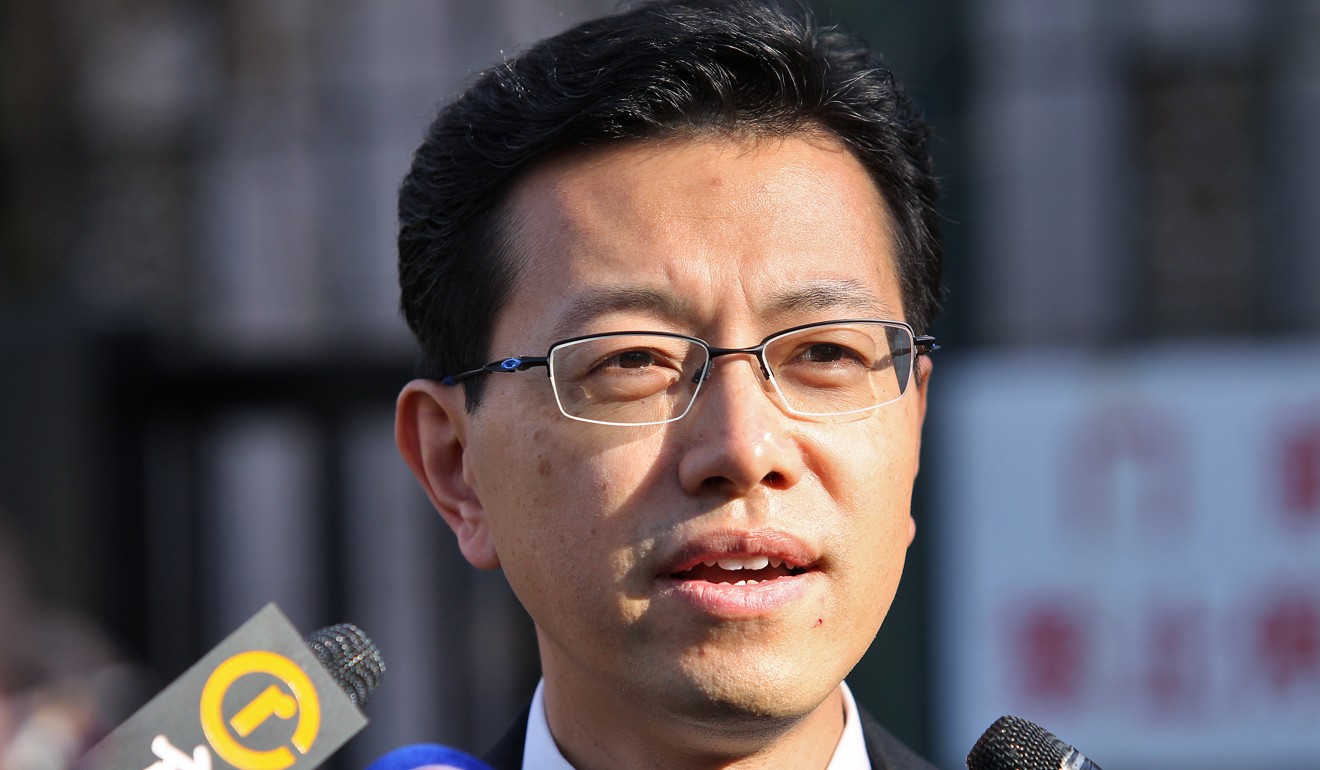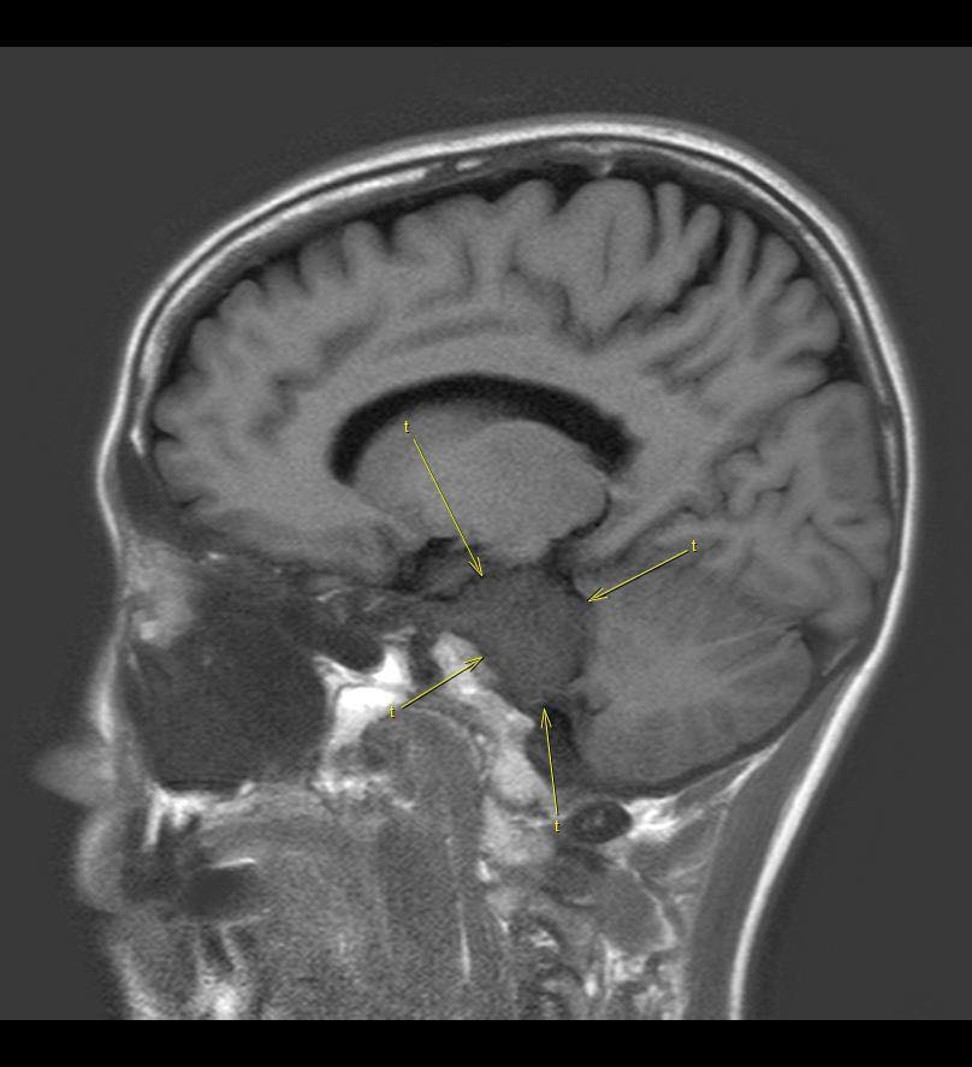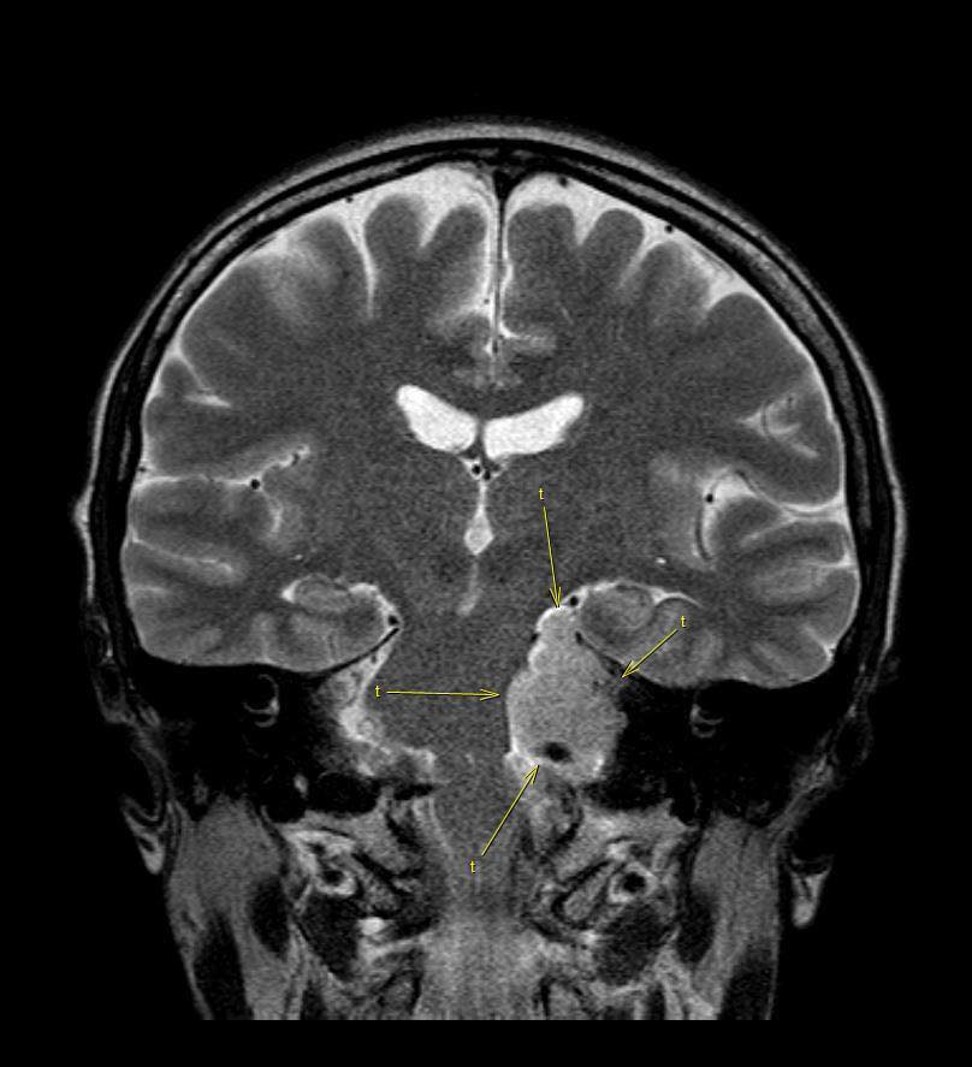
Brain tumour ‘larger than a ping-pong ball’ prompts deferment of Hong Kong lawmaker Tanya Chan’s Occupy sentencing
- Civic Party lawmaker says condition discovered after medical check-up as she was expecting long jail term and wanted to reassure her mother she was healthy
- Diagnosis on whether growth is cancerous can only be made during open-brain surgery
A life-threatening brain tumour “larger than a ping-pong ball” has prompted Hong Kong lawmaker Tanya Chan to ask for her sentence for civil disobedience to be deferred.
Four in the group, including two founding members, were jailed for up to 16 months at West Kowloon Court, while Chan’s sentencing was adjourned to June 10 after her condition was revealed. She would need to undergo surgery in two weeks.
Occupy leaders jailed for up to 16 months over roles in 2014 umbrella movement
Chan disclosed further details to supporters outside the court.
“I went for a physical check-up, which included a full-body magnetic resonance imaging, in a private hospital on April 4 because I expected to be jailed for quite a long period and I wanted to reassure my mother I could make it through,” Chan said.
I went for a physical check-up, which included a full-body magnetic resonance imaging … because I expected to be jailed for quite a long period
“My report was ready on April 11 but my conviction came on April 9 and 10, and I had travelled to Taipei with my mom to celebrate Mothers’ Day in advance.
“So I had my follow-up consultation at Canossa Hospital on April 17.”
Chan said she was told everything was normal except for “something in my brain”, and was advised to see a specialist.
She sought help from Dr Edmund Woo Kin-wai, a neurologist married to Chan’s senior colleague in the Civic Party, Audrey Eu Yuet-mee.
Following further check-ups, Dr Woo told Chan last Thursday she had a tumour with a diameter of 4.2cm in the left of her brain.
“It is larger than a ping-pong ball. And the more dangerous part is that it is pressing against and bending my brainstem, as well as some blood vessels and nerves,” Chan said.
The more dangerous part is that it is pressing against and bending my brainstem, as well as some blood vessels and nerves
The meningioma – a tumour that forms on membranes that cover the brain and spinal cord just inside the skull – can only be diagnosed as benign or malignant during open-brain surgery.
“I was told yesterday I should have surgery and get the tumour removed as soon as possible. I will have to go through radiotherapy afterwards,” the lawmaker said.
Chan said she did not expect the news even though she had experienced symptoms including dizziness and facial numbness.
“I thought I was just weak.”
Chan added she would apply to Legislative Council president Andrew Leung Kwan-yuen for leave and reduce her engagement in public activities, to take time for treatment and rest.
Who are the nine key leaders of Hong Kong’s Occupy movement
With Eu’s help, Chan arranged a pre-surgery examination on Thursday, when medical staff would further inspect the position and circumstances of her tumour.
“I am afraid but I will try my best to recover soon,” Chan said.
Neurosurgeon Dr Joseph Lam Ming-kuen said under general circumstances, brain tumours as large as Chan’s, even if benign, should be removed as soon as possible.
“If there is no treatment, the tumour will grow gradually … The [patient] will have difficulty moving. They may lose their balance while walking and may need the help of a stick, or there may be problems with hearing, an asymmetrical face [due to affected nerves or muscles] and vomiting,” Lam said.
He added that in the worst scenario, the condition could be fatal as it might result in breathing difficulties if left untreated.
Lam added the size of Chan’s tumour was considered big and if it was benign, it would have taken four to five years to grow to 4.2cm. Radiotherapy would be part of the treatment plan in general, if the growth could not be removed completely through surgery.
“If the tumour is attached to some important blood vessels or nerves which surgeons do not want to damage, part of the tumour may be kept … The rest would then be treated by radiotherapy.”
He said the length of such therapy could range from a few days to several weeks, depending on the size and location of the remaining tumour.
Leung, who was visiting Hangzhou with a delegation of lawmakers and government officials, said Chan’s application for leave was “reasonable and acceptable”.
Before explaining her condition, Chan had urged supporters and the general public not to lose faith or back down in their pursuit of democracy.
“I hope Hongkongers will not feel disappointed and terrified. Hongkongers should not regret or retreat. Otherwise we are unworthy of those who are going to jail for us,” she said.
The 79-day Occupy protests, which began on September 28, 2014, in Admiralty, were sparked by frustration with a restrictive framework Beijing had set for the election of Hong Kong’s leader.
Nine leaders, including Chan, were found guilty of a range of public nuisance charges on April 9 following an 18-day trial that revisited the civil disobedience movement through testimony from police officers, footage of the protests and the words of those who took part.
Occupy protests five years on: after all the prosecutions, was the movement in vain?
Eric Cheung Tat-ming, a principal lecturer at the University of Hong Kong’s law faculty, said the court could further adjourn Chan’s sentencing, depending on her health.
“It surely can’t be infinitely postponed. The court will decide according to reports and expert opinion of her situation,” Cheung said.
Both Cheung and Grenville Cross, former director of public prosecutions, suggested that in considering a suspended jail term, Chan’s health would also be taken into account.
“Serious health problems are capable of being exceptional circumstances, which can justify a suspended sentence,” Cross said.

Pro-establishment lawmaker Steven Ho Chun-yin and Stanley Ng Chau-pei, a Hong Kong delegate to the National People’s Congress, came under fire for critical comments posted on their Facebook pages.
“All of you turn out to have terminal diseases when it’s time to pay your debts. The game is all yours,” Ho wrote.
“Illness should have no bearing on sentencing. Are the criminals again playing procedures with the court?” Ng wrote.
Hundreds of angry comments flooded each of the posts, calling them callous, shameless, despicable and vicious. Some asked whether the pair were questioning the professional ethics of Chan’s doctors and the magistrate.

Both Ho and Ng refused to apologise for or retract their remarks.
“I was giving my first impression rather than picking on Chan,” Ho said.
“If I were one of the nine, I wouldn’t report my disease to the judge at this moment because it would hinder me from achieving my initial goal of pursuing justice by breaking the law.”
Ho said he would apologise to anyone who found his post offensive.
“But I won’t retract it because I should be honest and speak my mind.”
Ng said the court should deal with “humanitarian considerations” only after it had delivered the sentence.
“What I said has nothing to with whether I have sympathy or not,” he said. “I oppose the Occupy movement and I believe criminals should not be given cover.”
Pro-Beijing politician’s attack on Hong Kong judges earns stiff rebuke from Carrie Lam
Lawmaker Starry Lee Wai-king, chairwoman of the Democratic Alliance for the Betterment and Progress of Hong Kong, said Ho, also a party member, had reflected people’s feelings.
“The 79-day protest affected many people … some incurred actual economic losses,” Lee said.
“I think it’s inevitable people have different feelings and comments about it.”
She refused to say whether she thought the comment was appropriate.
Information technology sector lawmaker Charles Mok said: “I don’t know how Ho can face Chan when she returns, after saying those things.” he added.
Accountancy legislator Kenneth Leung Kai-cheong said Ho’s comment was inappropriate.
The Correctional Services Department (CSD) declined to comment on specific medical services available to inmates with serious health conditions such as Chan’s.
The department said people in custody were provided basic medical care by resident officers from the Department of Health and correctional staff with nursing qualifications.
Specialists from the Hospital Authority and the health department also provide consultation and treatment at correctional facilities on a regular basis.
“Resident medical officers will, if necessary, refer cases to public hospitals for further treatment,” a CSD spokesman said.
Additional reporting by Kimmy Chung, Sum Lok-kei and Alvin Lum




